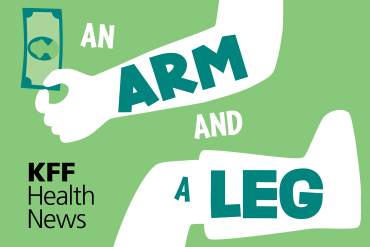The Nation’s 911 System Is on the Brink of Its Own Emergency
911 outages have hit at least eight states this year. They’re emblematic of problems plaguing emergency response communications due in part to wide disparities in capabilities and funding.
Her Hearing Implant Was Preapproved. Nonetheless, She Got $139,000 Bills for Months.
Even when patients double-check that their care is covered by insurance, health providers often send them bills as they haggle with insurers over reimbursement, which can last for months. It’s stressful and annoying — but legal.
An Arm and a Leg: The Woman Who Beat an $8,000 Hospital Fee
In this episode of “An Arm and a Leg,” host Dan Weissmann speaks with Georgann Boatright, a patient in Mississippi who was willing to drive to another state to avoid paying a steep fee to her local hospital.
HealthSherpa and Insurers Team Up To Curb Unauthorized ACA Enrollment Schemes
The initiative targets the biggest incentive driving fraudulent sign-ups and plan switches: the commissions that rogue agents or large call centers seek.
Despite Past Storms’ Lessons, Long-Term Care Residents Again Left Powerless
Even after multiple massive power outages — including one from a 2021 winter storm in Texas that prompted a U.S. Senate investigation — little has changed for older Americans in senior living facilities when natural disasters strike.
The Court Case That Could Upend Access To Free Birth Control
A lawsuit winding its way through the courts could undermine the power of federal agencies to mandate the services health insurance providers must cover. And that could threaten access to free birth control for millions of Americans. The case is called Braidwood Management Inc. v. Becerra, and it was brought by plaintiffs looking to strike […]
The Biden administration set stringent new federal staffing rules. But for years, nursing homes have failed to meet the toughest standards set by states.
‘A Bottomless Pit’: How Out-of-Pocket TMJ Costs Drive Patients Into Debt
Millions of Americans suffer from temporomandibular joint, or TMJ, disorders. The high cost and poor insurance coverage of TMJ care can bury patients in debt even as the treatments do more harm than good.
If Lawsuit Ends Federal Mandates on Birth Control Coverage, States Will Have the Say
An ongoing lawsuit aims to set aside the Affordable Care Act’s requirements that insurers cover preventive care, such as contraception. If that happens, state reproductive health laws — varying across the country — would carry more weight, resuming the “wild West” dynamic from before Obamacare.
Planned Parenthood to Blitz GOP Seats, Betting Abortion Fears Can Sway Voters
The reproductive rights organization hopes to oust GOP incumbents from key California congressional seats by highlighting the possibility of a national abortion ban. A state Republican official calls it a swing and a miss, noting that, under Democrats, hospitals have closed maternity wards and filed for bankruptcy.
Lack of Affordability Tops Older Americans’ List of Health Care Worries
Rising health care costs are fueling anxiety among older Americans covered by Medicare. They’re right to be concerned.
Beyond PMS: A Poorly Understood Disorder Means Periods of Despair for Some Women
Premenstrual dysphoric disorder is estimated to affect around 5% of people who menstruate, but a lack of research and limited awareness of menstrual disorders — even among health care providers — can make getting care difficult.
Mississippi Lacks Black Doctors, Even as Lawmakers Increasingly Target Diversity Programs
Administrators at the University of Mississippi School of Medicine are trying to recruit more Black students — and more Hispanic and Choctaw Nation students, for that matter. But they face several obstacles, including a recent swell of Republican opposition to diversity, equity, and inclusion efforts.
Fake Therapist Fooled Hundreds Online Until She Died, State Records Say
A Florida woman with no training in mental health services pretended to be a licensed social worker during online therapy sessions with Brightside Health patients.
The Concierge Catch: Better Access for a Few Patients Disrupts Care for Many
Increasingly, Americans pay for the privilege of seeing a doctor. Research shows concierge medicine can further hamper access to care for those who can’t afford the upgrade.
Federal Budget Constraints May Hurt Older Americans With HIV
Researchers say that by the end of the decade, 70 percent of people in the United States living with HIV will be older than 50. Thanks to advances in medicine, the diagnosis is no longer a death sentence. “I’ve been fortunate to take care of some people with HIV for over 30 years,” said Melanie Thompson, a physician […]
Closing of Rural Hospitals Leaves Towns With Unhealthy Real Estate
Dozens of small cities and towns across the United States struggle not just with health care access and the loss of jobs, but also with the burden of what to do with big, empty buildings.
Young Gay Latinos See Rising Share of New HIV Cases, Leading to Call for Targeted Funding
Since being diagnosed with HIV in 2022, Fernando Hermida has had to move three times to access treatment. A KFF Health News-Associated Press analysis found gay and bisexual Latino men account for a fast-growing proportion of new diagnoses and infections, showing they are falling behind in the fight against HIV.
Medicaid for Millions in America Hinges on Deloitte-Run Systems Plagued by Errors
The technology has generated notices with errors, sent Medicaid paperwork to the wrong addresses, and been frozen for hours at a time, according to state audits, court documents, and interviews. While it can take months to fix problems, America’s poorest residents pay the price.
It’s Called an Urgent Care Emergency Center — But Which Is It?
Suffering stomach pain, a Dallas man visited his local urgent care clinic — or so he thought, until he got a bill 10 times what he’d expected.


























